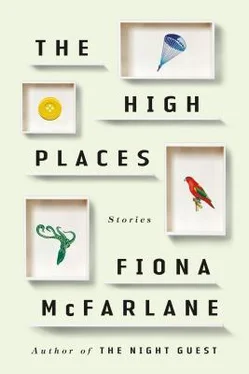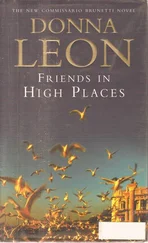‘How high up are they?’ he said, and we looked at each other and then back at where he stood, one hand shading his narrowed eyes. With relief, we realised he didn’t expect us to answer.
‘Maggie!’ he called to our mother. ‘Have you seen this? Would you look at this?’
And our mother didn’t say, Tell me when the soup boils over, tell me when the pond dries up, tell me when the minister arrives naked, but don’t tell me those Americans are falling from the sky again, again, again. She smiled and looked up toward the airborne Americans and said, ‘Just as long as they don’t land in my henhouse.’
‘They’re half a mile up,’ said Frank. I knew that to be the distance of our house from the Merrigool road, so I tilted that length into the sky and mentally ran along it, tiring quickly, as the Americans followed it down. ‘Half a mile up or more.’
Our mother sat the baby on her knee and let him throw his hands in and out of the peas. The frogs were beginning to sing, their bellies full of hard, cross music that sounded at the bottoms of our ears. That’s how we knew the day was ending. Now we would start to wait for Frank to come home. But here he was.
‘And how do they get home again? Do they walk?’ asked Frank.
We knew the answer to this. The youngest boy, smelling of pond weed and still a little of vomit, said, ‘The truck comes.’
‘The truck, eh?’ said Frank, and he turned to me.
‘Yeah, Dad,’ I said, surprised that he had looked at me, and proud. ‘They send a truck to pick them up and take them all back to base.’
The sky was empty now, and the truck was crossing over the hills, over the fields, filling up with Americans who laughed about holding their breath as they jumped.
‘All right,’ said our mother. ‘Who’ll help cook peas? Who’ll help cook the sweetcorn?’ It was a special dinner, and there was a job for everyone — everyone except Frank. We followed our mother into the house and moved among the different foods while Frank stayed outside, scanning the sky for a tiny plane half a mile up or more.
It was a special dinner because Frank was returning to work the next day. Our mother had killed two chickens and baked five different kinds of vegetables. The meal took a long time to cook and very little time to eat. There was fruit salad for dessert — oranges and apples. Frank told us stories about fruit picking in Queensland.
‘The queen of fruit,’ said Frank, ‘is the mango.’
He told us the mango tasted like sugar and cream and peach and banana all at once. He told us the sap could burn your skin like a hot stove. He told us about German men wrapped in shirts — one for the body, one for each arm and leg — who could pick a hundred mangoes in ten minutes. The possibilities of Frank’s previous lives occurred to me suddenly, and they tasted of oranges and apples.
Frank leaned back in his chair, looking at the ceiling as if he might see the Americans dangling there. ‘Tomorrow,’ he said, ‘I’ll cook us sausages for tea, burned on the skins the way we like ’em. Eh?’
‘You’re working tomorrow,’ said our mother.
‘Saturday then,’ said Frank, still inspecting the ceiling. Only he said it ‘Satd’y’, the way fathers do, the way their sons do: Tuesd’y, Thursd’y, Satd’y , familiar and friendly with the long days of the never-ending weeks.
That night I dreamed of rain. It started with clouds so low I could touch them if I stood on a chair. They were dense and solid; I could break pieces off and even taste them. They tasted of burnt sugar. I held one out to Nora and said, ‘Try some mango.’ When the clouds burst into rain, the noise on our iron roof was terrible. Nora was trying to sing, but no one could hear her. There was nobody else in sight — no American airmen, no Baptists, no brothers or mothers or Frank. Just me, and Nora, and rain and more rain, which looked like white hair. I stirred at some point, very early, and heard unfamiliar voices in the hallway, then swam back into my noisy dream of rain.
Later, Nora woke me to say that an American was missing and they were searching for him on our farm. My heart slowed. I thought of my fear, a secret until now, even to myself, that Frank had taken Curtis McAvoy, limb by extraneous limb, and buried him by the creek. But this was another American, Nora said, who’d jumped from the plane yesterday and never come back. We had watched him fall, shading our eyes and wondering if he was watching us: children lying on the grass by a pond, a mother on a rug with a baby, a father’s face lifted to the sky, looking like a family.
‘But the truck?’ I said, remembering what I’d told Frank, with such confidence, calling him ‘Dad’, and I thought of being wrong. I wondered if I would be punished.
Nora took me outside. Planes flew low overhead. We saw men we recognised and men we didn’t climb out of the creek gullies to be served cold drinks by our mother. Frank led the search. We spent the day watching him, proud of his authority, proud that he was stern and unforgiving, and pleased to see lesser men try to satisfy him. We stayed far from him, and kept quiet, and managed through a combination of helpfulness and invisibility not to be sent away somewhere less exciting.
We heard the sound of dogs at the creek and drew our feet in beneath us, squatting on the veranda. Other women came and we listened as they speculated that the American had copied Curtis McAvoy: shaken off his parachute, walked up the weary roads, found a travelling truck, and disappeared. We heard these things could be contagious. An old man stood with his foot on the veranda rail and said, ‘What we need is a tracker.’ Everyone laughed and then nodded, as if to say, Yes, we need a tracker. But there was no prison in Merrigool anymore, no mission, and only a small police station. Frank didn’t have a tracker working for him the way he might have years before. There were no black men in Merrigool.
In the late afternoon we helped our mother peel potatoes. We knew by the density of the air around the house that the American had not yet been found.
‘Where is he?’ I asked Nora, my hands brown with sticky dirt.
‘Maybe in Heaven,’ she said.
I thought of all the things I had done since watching the parachutes fall the night before. I had boiled peas and eaten my part of two chickens. I had learned about mangoes, and German men in shirts, and dreamed of rain. I had helped my mother bake scones and carried them to the gathered men and waiting women, fully conscious of the importance of my task. I had served drinks and peeled potatoes. The American had been lost this whole time.
I realised suddenly that any of the men we had helped untangle, who had fed us army-issue chocolate and showed us photographs of their sweethearts, could have been on the plane that crashed in the hills, could be this American who might never come back, and even if he was found, or that plane had never fallen, they would all be sent, anyway, to the war that had killed my father. I felt the way I did when I ran under the chute silk into a green world without sky or air.
And there in that world was Edith. She had arrived at our house with the sixth sense of lonely and loving and meddling people who fancy a crowd and an emergency.
‘Jean Louise,’ she said, in the old way, the way she used to before I was just another girl in one of her scripture classes. ‘Follow me. And you too, Eleanora. Follow me. And we’ll pray together for the return of the American.’
She spoke with kindness and authority, as if she had never stepped out of our kitchen and left us alone with Frank. We followed her, and no one saw us go.
* * *
The pond was gold in the late light, the colour of good wheat. Edith took us there, I suppose, because she was used to praying at the pond, a place of wet and joyous rebirth. Her footing over the sloping banks was uneasy but she maintained her constant bird chatter to God on the subjects of rescue and redemption. She held her tiny arms out like airplane wings to steady herself over the mossy rocks. And in her effort, praying and balancing, she didn’t notice what we did.
Читать дальше












